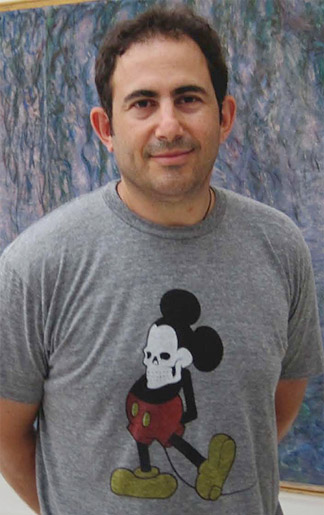
by Elizabeth England
What’s a PMD? Something every indie film budget needs, a Producer of Marketing and Distribution. Carole Dean’s interview with Jon Reiss was astounding in its torrent of knowledge and ideas, giving us a glimpse of the raw curiosity that drives Jon’s filmmaking. Daily Variety named him as a ‘digital director to watch.’ (Jon in Wikipedia.)
Check out his imdb.com!–fascinating films and subjects–Robotic Mayhem from Survival Research Laboratories; Bomb It featuring rave influencers Crystal Method and Moby; and Bomb It 2 exploring global graffiti leaders. His current project is producer and PMD (a dual role he doesn’t recommend) for a breast cancer awareness doc following the treatment choices, decision-making and post-treatment stories of several women.
This interview is so chockfull of smart info and brilliant ideas—I’ll share a few of the nuggets. (Listen to the interview for so much more!)
Nugget 1 – Every indie film budget needs a PMD, a Producer of Marketing and Distribution. The PMD develops and implements a marketing and distribution strategy at the start of the project. The PMD ensures early and ongoing engagement of the target audience through a storytelling platform, develops niche-influencer partnerships, and defines a festival, live event and digital strategy including merchandise and delivery. The PMD starts with a low percentage of budget and high time investment and inversely ramps up over the life of the project.
At the project’s start the PMD’s focus will be audience and partnership strategy and development, a big investment of the PMD’s time. As the project matures, the PMD’s budget will increase with live event, digital and merchandise strategy rollouts leading up to the ‘premiere’ event. Once the film is released, 100% of the budget becomes marketing and distribution related expenses.
Basically, it’s a key job that needs to be baked into today’s indie film budget if you want to “dent the media landscape,” as Jon put it. Makes sense, huh?
Nugget 2 – To engage, build and maintain your audience relationships, have a storytelling platform that lives alongside the film project. The storytelling platform will build your audience community and create a win-win relationship, nurturing partnerships with like-minded influencers and organizations in your story niche.
Jon’s example: His current breast cancer project examines the controversial questions about over-screening and overtreatment, trends in lumpectomies and mastectomies, and issues of reconstructive surgery. The breast cancer film’s storytelling platform is partnered with a like-minded charitable organization, sharing their audiences and publicity campaigns during the project. His tip for filmmakers with controversial subjects—engage influencers early and hold off on social media promotion of your topic until there are strong strategic partners with buy-in to share in diffusing controversy. A win-win for both, the breast cancer charity will ‘inherit’ the film’s storytelling platform after the film reaches distribution–a real motivator for charity buy-in.
Nugget 3 – Think about ways to engage your audience both episodically and for your one off film premiere. There was so much good advice here I’ll just touch on it so make sure you listen to Jon’s interview for more info. Powerhouses like Netflix and HBO are tapped into consumer preferences for series, gaining the advantage of repeating promo and recurring royalties for replays—but they have the ad money for series promo. Taking a cue from the series concept, Jon uses production and post-production to deliver a series of live events with film previews to elicit feedback, engage audience discussion and make adjustments for the desired impact. His idea: release discreet film clips with fanfare as a series to build fan base and excitement for the final product. Using this model, the live events format could range from mini-screening parties with interactive discussions, to publicity events…whatever suits your topic…or a mix of both during post-production. Post release, additional content not in the final cut makes great series content for ongoing audience engagement and film promotion on the storytelling platform. You can take any of this and run with it to suit your project. (This idea applies during the filmmaking and between projects, too, engaging your loyal fans until your next film is released.)
Audience development tips.
- Make the media match the audience: know who your audience is and develop content that engages them directly as early as possible in the project.
- Marshall geographic/regional support: If you can link your film subject to a community or region, you’ll interest local press and publicity for your project.
- Strategic relationships: develop win-win relationships with both influencers and organizations in your niche subject. Having the support of celebrities, bloggers, charities, civic groups or even government agencies to develop your audience should be a win-win. To develop these relationships, just introduce yourself and connect, and be prepared to answer should they ask what you have to offer and what you want from them, such as screening outreach, dvd promotion, profit sharing, co-publicity events, etc. Jon’s breast cancer strategy started with the influencers and organizations in the breast cancer niche, then expanded to embrace influencers in women’s health.
Some last few tidbits to chew on:
- One off films are easier to produce events around than a series because a filmmaker has more opportunity to dent the media landscape—but take advantage of series elements in your marketing.
- Your final film doesn’t have to have a 90-minute format! 45 minutes more or less is an optimum length for a live event with publicity or a screening party with interactive discussion.
- Check out the interesting events other indie filmmakers are doing like This American Life and HitRECord.
Jon wants to talk to you. He made it clear in this interview that he is very curious about what you are up to – he just loves talking to filmmakers. Once again, thanks go to From the Heart’s Carole Dean for her extensive reach into the world of independent filmmaking to deliver this great interview. Here’s more info from Jon, including how to get him on the phone for a chat: www.jonreiss.com; Jon in Wikipedia; Think Outside the Box Office; and Jon’s Free Consultation.

